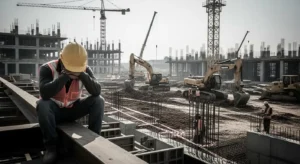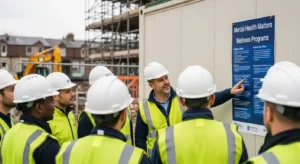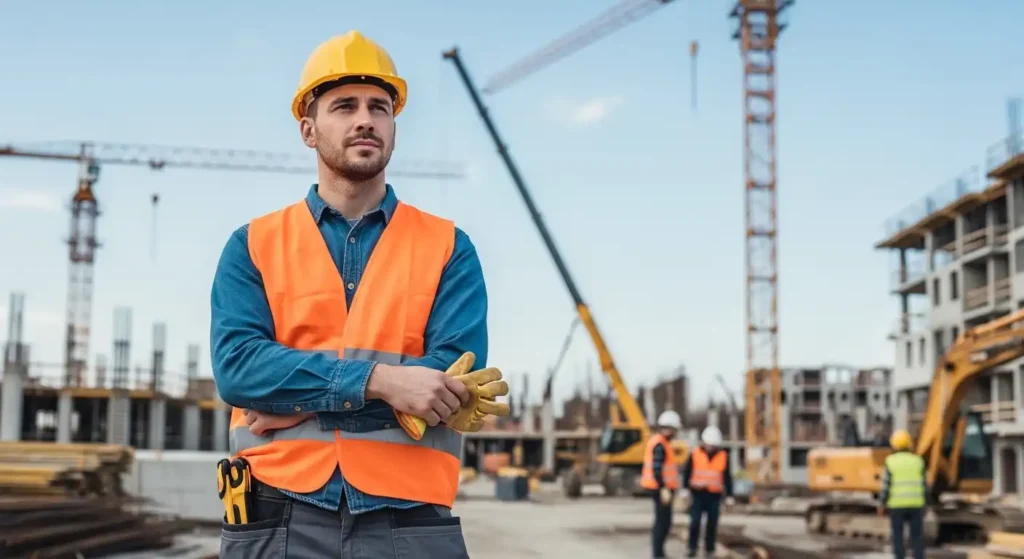Introduction:
When we think about construction site safety, physical risks such as falling from heights, heavy machinery accidents, and exposure to hazardous materials often come to mind. However, there’s a growing focus on the mental health of workers, recognizing that psychological well-being is just as important in preventing accidents and improving productivity. Over the past few years, mental health initiatives have become an integral part of construction safety programs, and in this post, we’ll explore why mental health should no longer be overlooked on construction sites.
The Link Between Mental Health and Construction Site Safety
 Work in the construction industry is inherently stressful. The physical demands of the job, long hours, and the high-risk environment can lead to burnout, anxiety, and depression among workers. Research has shown that mental health issues can directly impact physical safety. Stress, fatigue, and anxiety can reduce a worker’s ability to focus, increasing the likelihood of mistakes or accidents.
Work in the construction industry is inherently stressful. The physical demands of the job, long hours, and the high-risk environment can lead to burnout, anxiety, and depression among workers. Research has shown that mental health issues can directly impact physical safety. Stress, fatigue, and anxiety can reduce a worker’s ability to focus, increasing the likelihood of mistakes or accidents.
In addition to physical risks, mental health challenges such as depression and anxiety can also manifest as substance abuse problems. Workers may turn to alcohol or drugs as a way to cope with stress or emotional pain, further endangering themselves and their coworkers. Addressing these mental health challenges not only improves the well-being of workers but also significantly reduces the risk of accidents on-site.
Why Construction Companies Are Focusing on Mental Health Initiatives
Construction companies are increasingly recognizing that mental health initiatives can enhance overall safety and productivity. In the past, mental health has been a taboo topic in many industries, particularly in blue-collar sectors like construction. However, with growing awareness about the importance of mental well-being, more companies are starting to integrate mental health support into their safety programs.
By addressing mental health, companies can create a more supportive and resilient workforce. Employees who feel supported and are equipped to handle stress are less likely to experience burnout, and they are more focused on their work, reducing errors and accidents. Moreover, providing mental health resources can improve employee morale, retention, and job satisfaction, making it a win-win situation for both workers and employers.
Common Mental Health Challenges in the Construction Industry
Several factors contribute to the high rates of mental health issues in the construction industry. Some of the most common mental health challenges include:
- Chronic Stress: The physical demands of construction work, coupled with long hours and tight deadlines, can lead to chronic stress.
- Burnout: Repeated exposure to high-pressure environments, coupled with a lack of adequate support, can result in burnout, leaving workers feeling mentally and physically drained.
- Depression and Anxiety: The pressures of the job, as well as the isolation that sometimes comes with construction work, can lead to feelings of sadness, hopelessness, and anxiety.
- Substance Abuse: To cope with the physical and emotional strain of the job, some workers may turn to alcohol or drugs, which can lead to addiction and exacerbate mental health issues.
How Mental Health Initiatives Can Help
Mental health initiatives in construction safety programs can take many forms, from counseling services to stress management workshops. These initiatives aim to provide workers with the tools and resources they need to manage stress and maintain good mental health while on the job. Some of the most effective mental health programs include:
- Employee Assistance Programs (EAPs): EAPs offer confidential counseling services for workers struggling with personal or emotional issues. These programs provide a safe space for workers to talk about their problems and receive professional support.
- Stress Management Training: Workshops and training programs focused on stress management can help workers learn coping techniques, mindfulness, and relaxation exercises that can be applied both on and off the job site.
- Peer Support Networks: Establishing peer support networks allows workers to share their experiences and support each other in a safe, non-judgmental environment. Having someone to talk to can make a huge difference in addressing mental health issues.
- Mental Health First Aid Training: Just as workers are trained in physical first aid, mental health first aid training equips them with the skills to identify signs of mental health struggles in their coworkers and refer them to appropriate resources.
The Business Case for Mental Health Programs
Investing in mental health initiatives not only benefits workers but also improves a construction company’s bottom line. Mental health issues cost the global economy billions each year, and construction companies are not immune to these costs. By providing mental health support, companies can reduce absenteeism, lower turnover rates, and prevent the costly legal and financial consequences of accidents caused by stress or substance abuse.
Moreover, mental health programs can boost productivity. Workers who are mentally healthy and supported are more focused, engaged, and efficient. Companies that prioritize mental health are also more attractive to top talent, as workers are increasingly looking for employers who offer a supportive and healthy work environment.
How to Implement Mental Health Initiatives on Construction Sites
 For construction companies looking to implement mental health initiatives, the process starts with creating a culture of openness and support. It’s essential to foster an environment where workers feel comfortable discussing mental health issues without fear of stigma or retaliation.
For construction companies looking to implement mental health initiatives, the process starts with creating a culture of openness and support. It’s essential to foster an environment where workers feel comfortable discussing mental health issues without fear of stigma or retaliation.
In addition to providing access to mental health resources, companies should offer training to managers and supervisors so they can recognize signs of mental health issues and offer support to their teams. Creating a supportive workplace culture that emphasizes well-being is key to the success of mental health initiatives.
Conclusion:
The importance of mental health in construction cannot be overstated. As the industry continues to evolve, mental health initiatives will play an increasingly critical role in ensuring workers’ safety, productivity, and overall well-being. By prioritizing mental health, construction companies can foster a more resilient workforce, reduce accidents, and create a positive work environment that benefits both employees and employers. The rise of mental health initiatives is not just a trend—it’s a necessary step toward creating safer, more productive construction sites for everyone.

